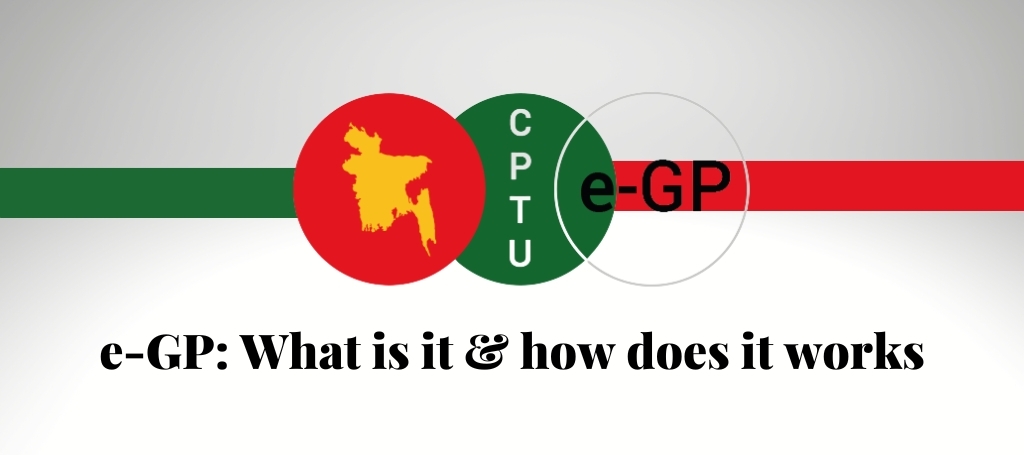One of the major development projects of the Bangladeshi government is e-GP, or electronic government procurement. It is an advanced, real-time, internet-based method for procuring goods, works, and services using taxpayer funds. The Ministry of Planning took the initiative to create an electronic government procurement system (e-GP) for all government purchases.
What is e-GP? What does it do?
The Central Procurement Technical Unit (CPTU), IME Division of the Ministry of Planning, designed, owns, operates, and maintains the National e-Government Procurement (e-GP) site of the Government of the People’s Republic of Bangladesh. The e-GP system provides public agencies, including procuring agencies (PAs) and procuring entities (PEs), with an online platform to conduct all procurement processes.
The e-GP system is a single website where PAs and PEs can perform procurement-related tasks using a dedicated, secure web-based interface. It is hosted in CPTU’s e-GP Data Center, and the PAs and PEs access the internet-based portal for their use.
Implemented as part of the Public Procurement Reform (PPR) Program and supported by the World Bank, this comprehensive e-GP system ensures efficiency, accountability, and transparency in public procurement processes in Bangladesh.
Importance of e-GP in Bangladesh
In the traditional manual method of procurement, there is significant scope for fraud and irregularities. Threats from criminals during the submission of offers are common. Additionally, vested interests often support individuals engaging in corrupt practices during procurement activities.
These undesirable situations cause immense suffering for the public. To address these issues, the government introduced the e-GP system for procurement in key departments, including the Roads and Highway Department (RHD), Bangladesh Water Development Board (BWDB), Rural Electrification Board (REB), and Local Government Engineering Department (LGED), in 2011.
Through a unique digital platform, e-GP ensures transparency and accountability in procurement processes. This system saves time and money for both the purchasing institutions and bidders. The government deserves commendation for automating public procurement, which involves a development budget exceeding $1,500 billion annually.
Benefits of e-GP in Bangladesh
With the use of ICT, especially electronic procurement, public procurement becomes far more transparent, effective, and efficient. This benefits developing nations and the economy overall. Transparent business practices ensure better resource allocation through more competition, improved squality of purchases, and financial savings for governments and taxpayers. Additionally, they encourage greater investment by reducing risks.

Implementing such systems enhances economic development and government productivity by:
- Reducing Government Purchase Costs
Government public tenders are instantly uploaded on websites with search and alert options for suppliers. e-Procurement also broadens procurement options, increasing competition and offers. - Increasing Public Confidence in the Government
Public trust in government is essential for national stability, especially in large-scale investments like infrastructure projects. - Achieving Better Returns on Investment
Value for money is calculated as the total benefits received from goods or services relative to their total cost. e-Procurement systems enhance value for money in government and reduce procurement costs. - Reducing Corruption
Public contracting is a high-risk area for corruption. When taxpayer money is diverted, resources are wasted, and public safety can be jeopardized. e-Procurement transforms public procurement into a transparent process, reducing costs and increasing profitability for local businesses. - Improving Tax Compliance
Governments often use procurement to support and promote local SMEs. Reforming procurement through e-Procurement benefits emerging economies by increasing transparency, improving accountability, and lowering costs.
Access to the e-GP System
According to the Terms and Conditions of Use, Disclaimer, and Privacy Policy, all stakeholders—including bidders/tenderers/applicants/consultants (national and international), PEs, procurement-related committees, payment service providers, development partners (DPs), media, system administrators, auditors, and the general public—have access to the e-GP system and its information.
However, only during the pre-configured time period set by the PE do members of the evaluation committee gain access to the e-GP system and bids. The e-GP system automatically generates a comparison matrix based on each tender’s quoted price and evaluation criteria, which is forwarded to the evaluation committee.
e-GP is essential for Bangladesh’s tendering process. To learn more or register, visit the official website.
You Can Read Also: Requirements that you need to know before submitting a Tender?

